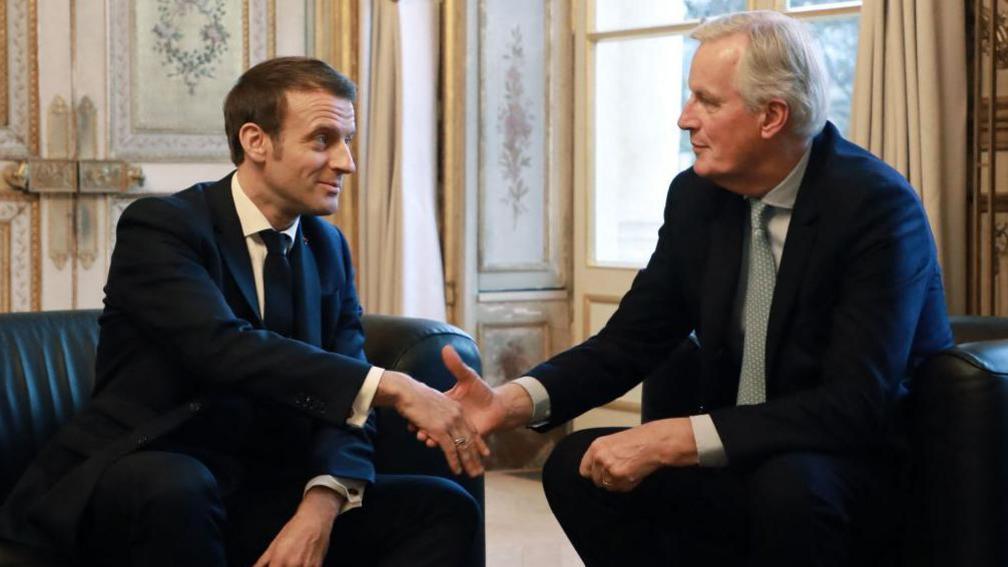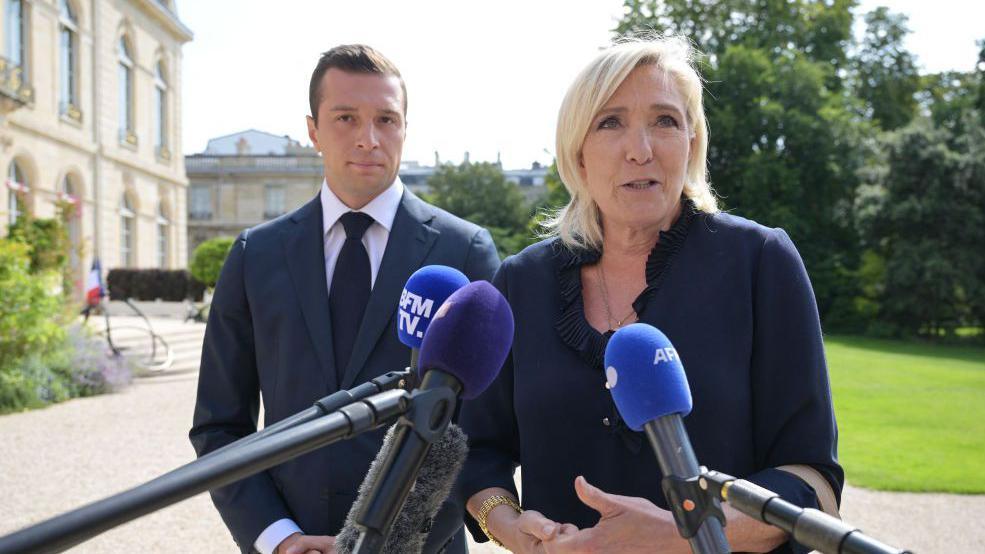Monsieur Brexit buys Macron time, but French deadlock remains

Michel Barnier (R) will need all his negotiating skills if his government is to last
- Published
Michel Barnier is not the solution to Emmanuel Macron’s self-inflicted travails, because there is no solution to the presidential fix.
Numbers are numbers, and in the current state of parliament the politician does not exist who can command a guaranteed majority.
What the former Mr Brexit might be able to do is buy the president a little time.
If by Christmas, Mr Barnier still happens to be in office – that will be regarded as a job pretty well done.
The last weeks of Macronian dithering have been painful to follow. Over and again his aides have chucked out trial balloons to an avid press corps – only to have each potential prime minister disavowed the following day.
Over and again we have been told that an appointment is imminent – only for the candidate to develop sudden handicaps that made them unsuitable for the post.
In each case, President Macron had to be sure that the potential nominee would fulfil two criteria.
First, that he or she would not unravel the president’s legacy – notably the pension reforms introduced so painfully two years ago.
And second, the person had to be – in the jargon – “non-censurable.” In other words, they had to be able to avoid automatic rejection – and ejection – by the oppositions in the Assembly.
Michel Barnier, 73, a calm, unrufflable former minister with proven negotiating skills, might finally fit the bill.
Michel Barnier named by Macron as new French PM
- Published5 September 2024
After France's election shock comes the real power struggle
- Published8 July 2024
Being on the centre right, he approves of the pension reform. Indeed when he ran in 2021 for the conservative nomination for the presidency - he lost out to Valérie Pécresse - he proposed pushing the retirement age back even further, to 65.
And on the vote of confidence issue… well there is the rub.
It just happens that Marine Le Pen – whose populist National Rally (RN) is one of the three roughly equivalent blocs in the Assembly – has said she will not automatically vote against a Barnier government.
If she did, then Barnier would automatically fall because the left will always vote against him.
Marine Le Pen does not unconditionally loathe Michael Barnier the way she loathed another centre-right potential PM, Xavier Bertrand.
And at the 2021 primaries, Mr Barnier said some quite tough things about immigration, even suggesting France could try to bypass the European courts of justice and human rights. That stands him in good stead too.

Marine Le Pen's National Rally will wait and see what Mr Barnier's plans are
So National Rally is hinting now that it will wait before bringing Barnier down. If his programme includes positive measures on immigration, the cost of living and – crucially for her – proportional representation, then, the party's leaders say they might give him a stay of execution.
Some consolation.
For the fact remains that for all his courtesy, patience and experience Mr Barnier will from day one be governing on borrowed time.
The left-wing alliance the New Popular Front – which came out top in July’s election – is furious at the choice of prime minister.
As far as they are concerned, the left won the vote, and it was therefore President Macron’s constitutional duty to appoint a prime minister from the left-wing camp. That he has thwarted their plans will for many be a legitimate reason for street protest.
Everything depends now on Mr Barnier’s choice of ministers, and how far he chooses to exert his autonomy from the president.
In theory he has freedom to be his own man. Emmanuel Macron has admitted he lost the election, and under the French constitution it is the government, under the prime minister, that sets and carries out policy.
But by temperament, and political inclination, Michel Barnier is unlikely to depart very far from the Macron agenda. They are both men of the centre, with right-wing leanings on the economic front.
They are also both big Europeans, seeing the EU as the necessary outlet for French greatness. And they believe, in theory at least, that deficits have to be brought down, not least because that is what the EU is demanding.
He is, in other words, a very establishment figure, of the type that both left and populist right believe France had voted in July to get rid of.
So if it turns out that Barnierism is just Macronism by other means – and the budget debate next month will be the first crucial test – then all the new prime minister’s vaunted negotiating skills will be of little avail against the backlash in a hostile new Assembly.